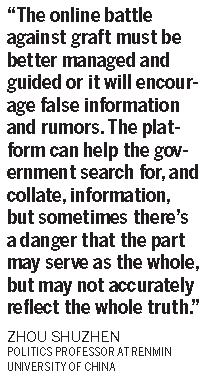Micro blogs make graft fight hot news
Updated: 2013-05-15 08:50
By Cui Jia and Cao Yin (China Daily)
|
||||||||
Some people believe they will not be punished if they forward untrue posts or even publish false information, because the authorities cannot determine the original source among the thousands of posters and forwarders, "but they can be charged with defamation or spreading false accusations, according to the current laws", he said.
Web companies and some local governments also have the power to establish "black lists" to warn those who repeatedly publish false information and possibly fine them, he added.
Zhou Shuzhen, a politics professor at Renmin University of China, agreed that social media can play a major role in cracking down on official corruption, but warned it can only reflect the tip of the iceberg.

"The online battle against graft must be better managed and guided or it will encourage false information and rumors," she said. "The platform can help the government search for, and collate, information, but sometimes there's a danger that the part may serve as the whole, but may not accurately reflect the whole truth."
In this way, the challenge of making better use of the Internet and social media is more important than the platform itself, she added.
One employee of a micro blog service provider, who declined to be named, said the company will not disclose user information to the authorities even if users publish false allegations. The disclosure of this information is prohibited by a clause in the service contract customers sign before opening their online accounts.
However, the intention of some people who make allegations, such as reporters, is to arouse the attention of the disciplinary authorities, and therefore they are actively encouraging the authorities to question them about their claims, according to the unnamed employee.
"In fact, Web companies are just platforms and anti-graft work has little relation to us. The authorities can directly contact those who publish information," he said, adding that all the companies can do is delete information which is proven to be false.
A civil servant, in his 20s from Northeast China's Heilongjiang province, said he was not afraid of being investigated and is willing to be supervised by the public, but admitted he was concerned about unfounded, malicious attacks that could undermine his standing and reputation.
"At present, social media is a popular way of exposing corruption. It will put a certain amount of pressure on those who commit these crimes, but should never have a negative effect on those who are doing a good job," said the unnamed employee.

 Michelle lays roses at site along Berlin Wall
Michelle lays roses at site along Berlin Wall
 Historic space lecture in Tiangong-1 commences
Historic space lecture in Tiangong-1 commences
 'Sopranos' Star James Gandolfini dead at 51
'Sopranos' Star James Gandolfini dead at 51
 UN: Number of refugees hits 18-year high
UN: Number of refugees hits 18-year high
 Slide: Jet exercises from aircraft carrier
Slide: Jet exercises from aircraft carrier
 Talks establish fishery hotline
Talks establish fishery hotline
 Foreign buyers eye Chinese drones
Foreign buyers eye Chinese drones
 UN chief hails China's peacekeepers
UN chief hails China's peacekeepers
Most Viewed
Editor's Picks

|

|

|

|

|

|
Today's Top News
Shenzhou X astronaut gives lecture today
US told to reassess duties on Chinese paper
Chinese seek greater share of satellite market
Russia rejects Obama's nuke cut proposal
US immigration bill sees Senate breakthrough
Brazilian cities revoke fare hikes
Moody's warns on China's local govt debt
Air quality in major cities drops in May
US Weekly

|

|








